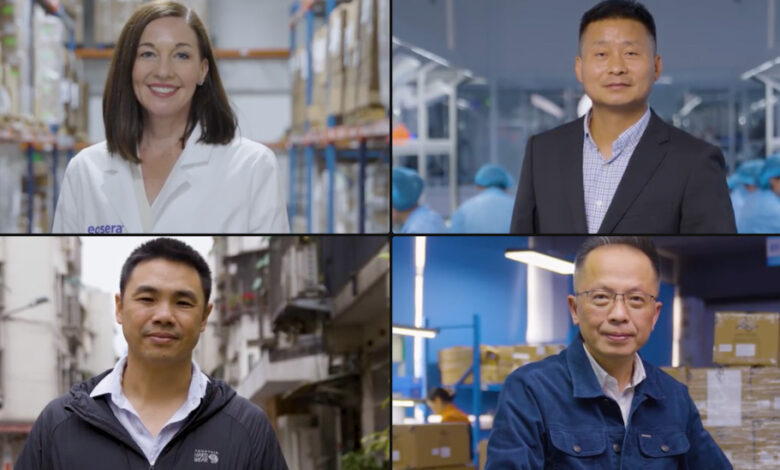Trump’s Tariffs Strain US-China Small Business Ties

American entrepreneur
Ms. Dickerson
Chinese entrepreneur
Mr. Hu
American entrepreneur
Mr. Soong
Chinese entrepreneur
Mr. Wong
When Elyse Dickerson needed to build out her U.S. ear care business quickly, she turned to Gorton Hu in China to make essential parts.
But Eosera, much like numerous American businesses, had a deep connection with its Chinese partner. Mr. Hu’s company was responsible for designing all the molds for Eosera’s products, including one of its key items. Ms. Dickerson mentioned that switching entirely to U.S. suppliers would be too costly and time-consuming, taking months if not years to accomplish.
In an effort to avoid paying hefty tariffs, Ms. Dickerson halted her shipments for a month, a decision that was also made by several other American clients of Mr. Hu. Now, with the temporary reduction in tariffs, the company is racing to get orders onto container ships, facing competition from others with the same idea and higher shipping costs.
Despite the uncertainty, they are keen on continuing their partnership. Ms. Dickerson and Mr. Hu have renegotiated their contracts to share the additional costs, both hoping for significantly lower tariffs in the near future. Mr. Ripp, aged 37, has transitioned from being an outdoorsman to an entrepreneur, focusing on a product that enhances his time spent in nature. Last year, he and his business partner embarked on a venture to produce a camper designed to fit in the bed of a standard American pick-up truck. This camper, more affordable than a full-size recreational vehicle, offers amenities such as a refrigerator, air-conditioning, and the capability to be off-grid in nature for extended periods.
Designing the camper was one challenge, but building it was another. To optimize the limited space within the camper, each component is carefully crafted to fit together seamlessly, requiring the securement of numerous parts. Mr. Ripp, along with his team at Outpost Campers, understood the necessity of sourcing components from China to bring their vision to life.
Relying on Chinese components is a reality in the camper manufacturing industry, as some parts have no viable alternatives. For instance, the camper’s battery system is exclusively made in China. Leveraging the Chinese supply chain enabled Mr. Ripp to kickstart production swiftly. Since last summer, his team of 13 employees has maintained a rigorous production schedule, aiming to produce two campers per week.
However, the imposition of tariffs on Chinese goods posed a significant challenge for Mr. Ripp’s start-up. The sudden disruption in the supply chain forced him to navigate through uncertainties to keep production running smoothly. Faced with escalating prices and uncertain availability of components, Mr. Ripp decided to stockpile six months’ worth of supplies by investing over $400,000. This strategic move allowed him to secure key parts at pre-tariff prices, including the critical Chinese battery system.
Looking ahead, Mr. Ripp remains cautious about the obstacles that lie ahead. While he believes he is prepared until the fall, the looming threat of sky-high tariffs on Chinese goods leaves him uncertain about the future. Despite the challenges, Mr. Ripp is determined to navigate through the uncertainties and sustain his business in the ever-changing landscape of international trade. Rewrite the sentence “The cat sat on the mat” as “The mat was sat on by the cat.” sentence: Please complete the survey by the end of the day. sentence: Please make sure to lock the door before leaving.





